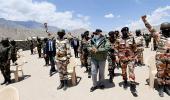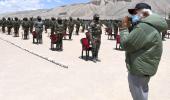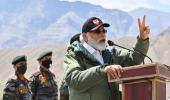India has experienced hands and will emerge with flying colours, declares Inspector General Gurdip Singh Uban (retd).
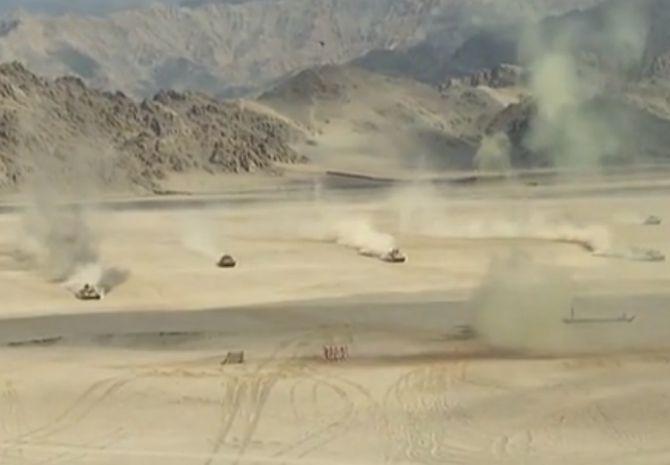
Immersed as the world was, in combating an unprecedented pandemic, China upped the ante by its military manoeuvres and territorial onslaughts on nations in the South China Sea, cartographic aggressions in the Indo Pacific region, combined with an aggressive display of naval and air power.
Forays into Indian territory were an adjunct. Nations at the receiving end scampered to put up a united front against this unexpected rampage.
The US responded by sending two carrier battle groups with their substantial lethal assets of aircraft, cruisers, guided missiles, destroyers and submarines to patrol the South China Sea.
Also to maintain surveillance over the choke point of the Malacca Straits through which some 94,000 vessels pass each year carrying a fourth of the world trade.
There was accelerated focus on the QUAD and a desire for a combined front at international forums.
Even as these events were unfolding, China engineered a significant manoeuver with wide ranging ramifications.
China has signed a $400 billion deal with Iran spanning 25 years. It encompasses a wide range of important sectors of Iranian economy such as banking, ports, rail and telecommunications.
It incorporates joint training by their Armed Forces which covers weapons and equipment, and the sharing of intelligence.
Simultaneously, India has been eased out of the ongoing development of the Chabahar Port, the Chabahar-Zehadan rail link as also the development and exploitation of the Farzad-B oil field on which the ONGC was working, even as the IRCON had been working on the rail link for the last four years.
Even more disconcerting is the reported hand over of another port of Jash, merely 300 km from Chabahar, thus denying India access to Afghanistan and the Central Asian Republics.
With India hampered by US sanctions on Iran, this was something waiting to happen.
Reeling under economic sanctions and unable to exploit its oil reserves of 10% of the worlds proven oil reserves as also 15% of its gas, there will be little criticism to this deal over the proverbial China debt trap.
The situation can still be retrieved, as this deal has its opponents within Iran, even as it hampers the US trade agreements with the Central Asian Republics.
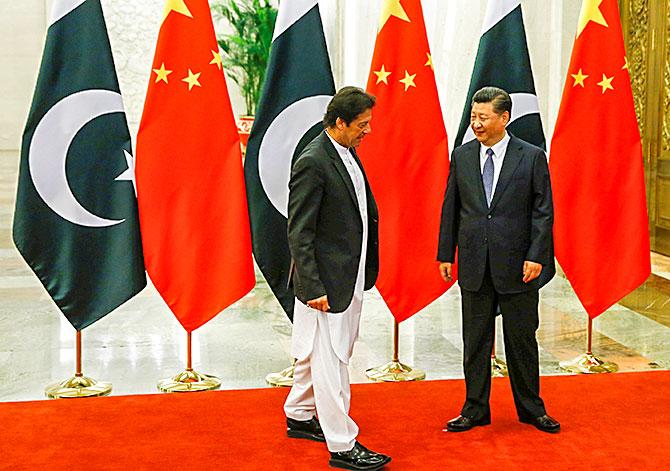
Simultaneously Imran Khan has inaugurated the Daimar Basha dam which has been built by China in Pakistan occupied Kashmir and signed up for another two, namely Azad Pattan and Kohalu, all part of the China Pakistan Economic Corridor to which India has objected to vigorously.
Ultimately, it boils down to dexterity and speed in decision making while putting money down on the table.
A quote from Shakespeare would drive the point closer home -- 'There is a tide in the affairs of men which, taken at the flood, leads onto fortune: omitted, all the voyage of their life is bound in shallows.'
Closer home, towards the end of April, the Chinese Western Theatre Command having completed exercises on the edge of the Gobi desert took to the Xinjiang highway with two motorised divisions.
In a well rehearsed move they branched off on to a series of feeder roads along the Line of Actual Control in Ladakh.
Once the stage had been set, they initiated multiple incursions across the LAC.
A mirror deployment by the Indian Army resulted in a clash in the Galwan valley about which much has been written.
After the Doklam incident, this was the next provocation.
Make no mistake, the Doklam plateau is of extreme strategic value poised as it is to dominate the Chumbi Valley dagger which in turn is the sword of Damocles hanging over the 'Chicken's Neck' of the Siliguri corridor.
Both sides have now agreed to a phased withdrawal, and the creation of buffer zones with limits of patrolling to avoid any further clashes.
The military commanders on the ground will no doubt ensure that the PLA withdrawal is confined not only to the roads, but includes the crucial heights that dominate these roads.
Of even greater importance is the amassing of PLA mechanised forces on the Depsang Plains which is a direct threat to our airfield at Daulat Beg Oldie.
To my mind, this is just a pause in an extended game of 'check mate'.
As mentioned in my previous article, we are dealing with a bellicose neighbour, with an obsession for reassertion of rights over land which their predecessors may have acquired through conquest or guile.
Their own history of submission for over a century to the Mongols, then to the Japanese, followed by the colonial powers that ruled over them are glossed over, as of little consequence.
China has land borders with 14 neighbours covering an estimated 22,100 km.
As its economic status burgeoned so did its military muscle. Based on a medieval mindset of the Middle Kingdom, the centre of the universe and head of the Confucian family, China has embarked on claims based on perceived imbalances of treaties forced on them when the country was weak.
Some of these have been resolved after bloody clashes such as with Russia and Vietnam, while others were resolved through a combination of lucrative offers of money, trade and guile.
In most cases, the end result has been such that victory can be claimed by both sides.
Russia accepted half of China's claim, Kazakhstan was given lucrative economic deals, who in turn promised help with the Uighurs, and Kyrgyzstan retained 70% of the land, ceding 30% to China.
Tajikistan gave up 1,000 square kms, less that 5% of the claim, while the Myanmar issue was settled with an oil deal.
Generally, nations wish to avoid war and prefer a settlement.
India with a strong central leadership, which has an overwhelming majority in Parliament, and with battle hardened armed forces, is no pushover.
We have displayed a strong resolve with our build up post Galwan. The lockdown for COVID-19 not only helped stem the rapid spread of the disease, but also gave time to plan the strategy ahead.
Now that there is a pause, it is time to plan our strategy ahead for our Nnorthern borders.
The India-China border stretches over 4,056 km (2,520 miles) and traverses one Union territory (Ladakh) and the four states of Uttarakhand, Himachal Pradesh, Sikkim and Arunachal Pradesh.
Mobilisation of considerable sections of the army, air force, navy and other assets has a high economic cost.
Factor into this the stocking of supplies for the additional troops and equipment which will be positioned there during the winter months when temperatures plunge well below zero.
Add to this, the value of weapon systems and platforms being procured hurriedly from across the world.
An economic cost has been imposed on us, even without a single shot having been fired.
As a soldier who has witnessed firsthand the death, destruction and devastation of the 1971 and Kargil Wars, I would opt for the adage of Sun Tzu: 'The supreme Art of Warfare is to subdue the enemy without fighting.'
Out of the box solutions, based on years of experience, which cannot be stated in articles or debated on television channels, could and should be examined.
We have very competent and experienced hands dealing with the current situation, and we will no doubt, emerge with flying colours.
Inspector General Gurdip Singh Uban (retd) commanded special forces and served as a senior instructor at the Army War College.
Feature Production: Rajesh Alva/Rediff.com

